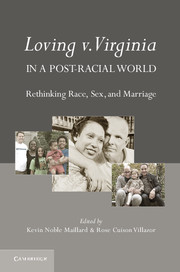Book contents
- Frontmatter
- Contents
- About the Contributors
- Acknowledgments
- Foreword
- Introduction Loving v. Virginia in a Post-Racial World
- Part One Explaining Loving v. Virginia
- Part Two Historical Antecedents to Loving
- Part Three Loving and Interracial Relationships: Contemporary Challenges
- Part Four Considering the Limits of Loving
- Part Five Loving Outside the U.S. Borders
- 14 Racially Inadmissible Wives
- 15 The Military and Interracial Marriage
- 16 Loving Across the Miles
- Part Six Loving and Beyond: Marriage, Intimacy, and Diverse Relationships
- Permission Granted
- Index
- References
16 - Loving Across the Miles
Binational Same-Sex Marriages and the Supreme Court
Published online by Cambridge University Press: 05 July 2012
- Frontmatter
- Contents
- About the Contributors
- Acknowledgments
- Foreword
- Introduction Loving v. Virginia in a Post-Racial World
- Part One Explaining Loving v. Virginia
- Part Two Historical Antecedents to Loving
- Part Three Loving and Interracial Relationships: Contemporary Challenges
- Part Four Considering the Limits of Loving
- Part Five Loving Outside the U.S. Borders
- 14 Racially Inadmissible Wives
- 15 The Military and Interracial Marriage
- 16 Loving Across the Miles
- Part Six Loving and Beyond: Marriage, Intimacy, and Diverse Relationships
- Permission Granted
- Index
- References
Summary
In May 2004, the Los Angeles Times reported a surge in travel to Massachusetts by many gay and lesbian couples, hoping to capitalize on that state’s monumental decision to be the first to recognize same-sex marriages. At least one couple chose not participate in the mass nuptials: Austin Naughton, an American, and his partner of many years, a Spanish national here on a temporary non-immigrant visa, decided not to wed for fear that this act would signal an intent to permanently reside in the United States. Under the Immigration and Nationality Act (“INA”), noncitizen who are in the United States on a temporary basis would be considered in violation of their status if they manifest any intent of remaining in the country permanently. As Naughton put it, “If we marry, he could be deported.”
Like Naughton, U.S. citizen Richard Adams has a partner who is also a foreign national, but from Australia. This man, Tony Sullivan, has a long-expired visa, and so Adams and Sullivan are “fugitives” from the U.S. Immigration and Customs Enforcement (“ICE”) bureau, which is part of the U.S. Department of Homeland Security, the federal agency that enforces the INA. If discovered, Sullivan would, most likely, be removed from the country and thus separated from Adams for several years. Accordingly, the couple keeps a low profile and lives quietly somewhere in the United States. More than twenty years ago, Adams and Sullivan had sued the predecessor to ICE, the Immigration and Naturalization Service (INS), arguing that their receipt of a marriage license in Colorado allowed Adams to petition for Sullivan’s “immediate relative” status as his “spouse.” The INA allows U.S. citizens and legal permanent residents (LPR) to sponsor their spouses to permanently immigrate to the United States. In affirming the INS’s rejection of Adams’s petition, the Ninth Circuit in Adams v. Howerton ruled that although the INA did not define the term “spouse,” the INS’s decision to limit its reach to heterosexual relationships was “rational.” As a consequence, Adams and Sullivan have never been able to fully receive the blessings of liberty that other American couples enjoy. Sullivan attributes their present financial difficulties to his “outlaw” status: “We would probably own our own home. We both love to travel. We would have been able to travel. I would have been a professional of some kind.”
- Type
- Chapter
- Information
- Loving v. Virginia in a Post-Racial WorldRethinking Race, Sex, and Marriage, pp. 217 - 232Publisher: Cambridge University PressPrint publication year: 2012



